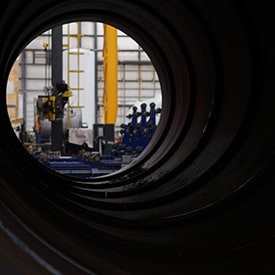TWS is a Great Training Option for Everyone
Learn more about how we can prepare you to advance your career.
Do you consider yourself realistic, organized and practical?1,2
Do you enjoy tinkering with tools and machines, working outdoors and fixing things?2
Are you interested in understanding mechanical laws to build or repair structures around you?2
If you answered “yes” to these questions, you may have the personality that could match well with a pipefitting career.1
Have You Considered a Career in the Skilled Trades?
Fill out the form to recieve a no obligation info packet.
Keep reading for 5 specific reasons pipefitting might be a good career for you to check out.
5 Good Reasons to Think about a Pipefitting Career
Pipefitting can be a great career, but it’s not for everyone. Pipefitters may need to lift heavy materials, work in tight spaces or work outdoors in all kinds of weather.3 They need to be physically strong enough to lift and move heavy pipes and mentally sharp enough to diagnose and repair problems related to piping.2
Most people who enjoy a pipefitting career tend to like practical, hands-on problems and solutions and working with physical materials.4
If this sounds like you, you might consider enrolling in pipefitting training like the Professional Welder with Pipefitting Training at Tulsa Welding School to prepare for an entry level job.
Why Pipefitting Could Be a Good Career

- Steady employment and good pay: The first thing most people think about when considering any career is salary potential. Most pipefitters work full time, and many report earning good pay.5,6 Apprentices earn less than fully trained pipefitters, and salary generally increases with time and work experience.5
As an industry, pipefitting jobs may fluctuate slightly based on the economy and available workers.7 However, society relies on industrial piping systems to function, and these pipes will likely always need maintenance, even during economic downturns.7 So, this could be considered a relatively stable field.7
- Hands-on thinking and problem solving: Pipefitters tend to be people who enjoy thinking practically to solve material problems.4 In pipefitting training and on-the-job training, an apprentice pipefitter may learn a great deal about:
- Relevant tools and machines
- Materials and methods for construction and repair
- Design techniques and blueprints
- Some mathematics8
This well of knowledge can then be applied to the tasks a pipefitter does on a daily or weekly basis, such as fabricating parts, cutting metal components, creating diagrams, installing piping, welding or maintaining fixtures.8
Critical thinking is a key part of a pipefitter’s job, as well as organizing information and troubleshooting.9,2,10
- Independent, yet structured environment: The path to receiving licensure is clearly outlined by rules and regulations set forth by state and federal guidelines, so the career trajectory of a pipefitter has some structure built into it.
Pipefitters tend to enjoy working in collaboration with others, but with a certain level of independence.4 Generally, pipefitters may have the option of joining a union.11
Understandably, being treated fairly by employers and having good relationships with supervisors is important.4 There can be room for individual exploration of preferences.6
- Opportunities to travel: Pipefitters may travel to different worksites, depending on the job.3 Some pipefitters especially enjoy the change of scenery, and may travel from a refinery to a paper mill to a gold mine in a span of a relatively short time.6 Pipefitting jobs may even require a few months of travel at a time.6
Some companies may actually specify that travel is a major part of the job. For example, you might be expected to travel year-round, with a few days at home when you’re not visiting a job site. Travel jobs may include paid travel time and lodging.12
If being on the road and experiencing new sights and sounds is something you enjoy, job possibilities like that for pipefitters certainly exist.
- Frequent new challenges: Pipefitters might consider themselves lifelong learners because they are often encountering new challenges and finding new ways to put their skills to use.6
This is a career path that is all about getting things done, solving problems and learning.6 Paying attention and asking questions is a great way to learn, and with the right attitude and interest, a pipefitting career could provide a great deal of long-term job satisfaction.6
Are You Up for the Pipefitting Career Challenge?
There is a lot to know in order to become a master pipefitter. This is not the type of job that can be learned in a week of training.
Pipefitting training programs and apprenticeships are designed to teach the basic skills needed to begin, but a pipefitter will likely continue to learn new skills, troubleshoot new problems and face new challenges.6,11
If this sounds exciting to you, and you understand the physical and mental requirements of the job, consider your future. A career in pipefitting may be calling.
1https://www.careerexplorer.com/careers/pipefitter/personality/
2https://www.truity.com/career-profile/plumber-pipefitter-or-steamfitter#
3https://www.bls.gov/ooh/construction-and-extraction/plumbers-pipefitters-and-steamfitters.htm#tab-3
4https://apps.illinoisworknet.com/cis/clusters/OccupationDetails/100413
5https://www.bls.gov/ooh/construction-and-extraction/plumbers-pipefitters-and-steamfitters.htm#tab-5
6https://www.indeed.com/community/construction-extraction/what-do-you-enjoy-most-about-your-pipefitter-career/td-p/1391439
7https://www.bls.gov/ooh/construction-and-extraction/plumbers-pipefitters-and-steamfitters.htm#tab-6
8https://www.careeronestop.org/Toolkit/Careers/Occupations/occupation-profile.aspx?keyword=Pipe%20Fitters%20and%20Steamfitters&location=de&onetcode=47215201
9https://work.chron.com/process-becoming-journeyman-pipe-fitter-26457.html
10https://www.bls.gov/ooh/construction-and-extraction/plumbers-pipefitters-and-steamfitters.htm#tab-2
11https://www.bls.gov/ooh/construction-and-extraction/plumbers-pipefitters-and-steamfitters.htm#tab-4
12https://careers.r717.net/openings/show/1900
13http://www.build-oregon.com/blog/articles/do-you-have-what-it-takes-be-pipefitter
This blog has been labeled as archived as it may no longer contain the most up-to-date data. For a list of all current blog posts, please visit our blog homepage at https://www.tws.edu/blog/







